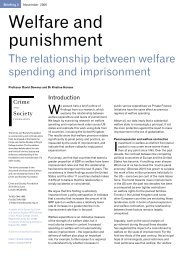PRISON SERVICE
PRISON SERVICE
PRISON SERVICE
- No tags were found...
Create successful ePaper yourself
Turn your PDF publications into a flip-book with our unique Google optimized e-Paper software.
Of course, this is more difficult than it sounds.Many of the behaviours that we in the criminal justicesystem think of as ‘helping’ individuals actually end upstigmatizing them or reinforcing their social andpsychological deficits by treating them as passiverecipients of some expert treatment. There is adifference, therefore, between beliefs in redeemabilityand support for rehabilitation. One can support arehabilitative regime without believing inredeemability.Again, there is a useful parallel in education: bothentity theorists and incrementalists believe in the valueof education. The difference is that whereasincrementalists support schooling because theybelieve that low achievers can learn to be highachievers through education, entity theorists mostlysupport education as a sort ofsifting process, separating thewheat from the chaff,determining which studentshave the natural aptitude forleadership and which studentsare destined to lesser things.Schools are good, then, attesting individuals’ capabilities,rather than actually teachingthem things.A similar essentialistmindset can be found in somestrands of offendermanagement where the focus ison risk assessment rather thanrisk reduction. Offendermanagement becomes a processof sorting individuals into lowriskand high-risk, amenablesand non-amenables, those thatwill succeed and those whowon’t. The danger is that by assigning groups of thepopulation to the category of irredeemable, we maybe creating a self-fulfilling prophecy that none of uswants to live out when those individuals are releasedfrom custody.Conclusions. . . in a societywithout thepossibility ofredemption, the‘past dominates thepresent and thefuture [and] everyfailure results inguilt from whichthere is no exit’.forgiveness, then there is no reason for those whohave offended to ever change their ways. Instead, in asociety without the possibility of redemption, the ‘pastdominates the present and the future [and] everyfailure results in guilt from which there is no exit’ 23 .Hannah Arendt talks about this as the ‘burden ofirreversibility’ in The Human Condition:Without being forgiven, released from theconsequences of what we have done, ourcapacity to act would, as it were, beconfined to one single deed from which wecould never recover; we would remain thevictim of its consequences forever, not unlikethe sorcerer’s apprentice who lacked themagic formula to break the spell 24 .The belief in redeemabilitymay not be a magic formula, butit can help to break habituatedpatterns or mindsets thatprisoners find themselves in, andin this way it can reducerecidivism by promoting culturesor at least subcultures ofdesistance even within a prison.Yet, the power ofredeemability goes beyond this.Redemption beliefs are alsogood for society in less tangibleways. In ‘Redemption andPolitics,’ Robert Smith writes:Unlike punishment, whichmobilizes our sense ofvirtue and sets us apartfrom the transgressor,forgiveness arouses in us,and depends upon, a sense of sharedweakness. We are moved to forgive out ofour own need to be forgiven for what wehave done in the past and what we may doin the future. Forgiveness, unlikepunishment, moreover, depends upon a lifeof common values and concerns 25 .Like with incremental models of intelligence, asocietal belief in moral redeemability is necessary‘because there has to be a way to restore people togood standing so that they’ll be motivated to return tocooperation with all of the other [law-abidingmembers] in the population’ 22 . If there is no chance atRedemption brings us together as a society in away that punishment and exclusion can’t. Durkheimtaught us that punishment was not first and foremostfor the prisoner, it was for us. Whether thepunishment deterred crime or reformed prisoners wassecondary to the effects that punishing others had on22. McCullough, M. E. (2008). Beyond revenge: The evolution of the forgiveness instinct New York: Jossey-Bass, p. 106.23. Smith, R. W. (1971). Redemption and politics. Political Science Quarterly, 86(2), 205-231, p. 206.24. Arendt, H. (1958). The human condition Chicago: University of Chicago, p. 213.25. Smith, 1971, p. 219.26Prison Service JournalIssue 192











